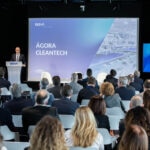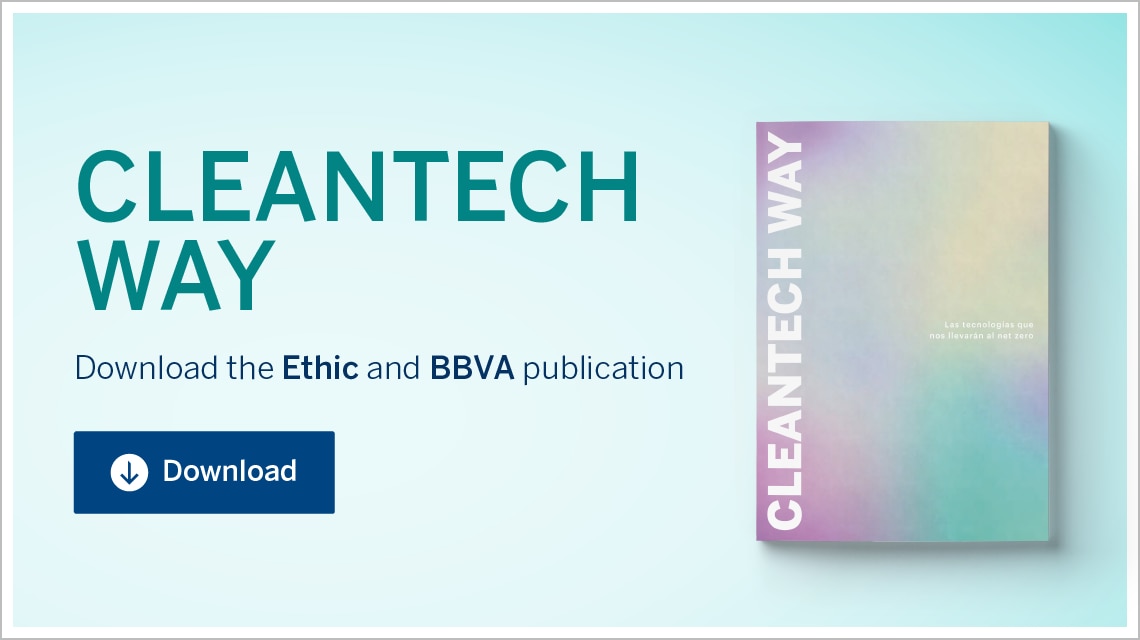BBVA CEO Onur Genç believes that decarbonization requires ‘massive’ capital investments. “Europe needs large banks to finance clean technologies, or ‘cleantech’, on a greater scale,” he said at an event held at the bank’s headquarters in Madrid.

“At BBVA, we are prepared to work closely with the Spanish government and European Commission to contribute to a favorable environment and promote the financial viability of cleantech on a large scale,” said Onur Genç at the ‘Ágora Cleantech’ event on clean technologies. It brought together over 100 institutional representatives, corporate leaders and experts in innovation and decarbonization who discussed the future of clean industry.
The BBVA CEO indicated that, although banking is not the main player in the energy transition, it acts as a financial intermediary with a crucial role in facilitating this change, and bridging the investment gap. “At BBVA, our role is not only to channel funds toward infrastructure and clean technologies; it is also to offer strategic advisory services to businesses and investors,” he added.
Onur Genç recalled the need to simplify procedures and streamline permitting–not only for renewable energy projects, but also for key technologies, such as biofuels, energy storage, hydrogen and carbon capture, utilization and storage (CCUS). He also stressed the importance of implementing more specific and effective public financing mechanisms to reduce the risks associated with clean technologies, both in the initial stages, and during scaling-up.

BBVA CEO Onur Genç during 'Ágora Cleantech' event.
The Clean Industrial Deal, an opportunity for Europe
In this regard, he highly valued the boost provided by the European Commission’s Clean Industrial Deal. “As Mario Draghi indicated, this deal is a critical step toward bridging our innovation gap and turning carbonization into a competitive advantage for Europe,” Genç said. In his opinion, “It is in our hands to turn the global challenges we are currently facing into a great opportunity for a stronger, more competitive Europe,” he concluded.
Ralph Schmitt-Nilson, Head of the Unit, DG Grow, at the European Commission, participated in the event, and presented the main concepts in the Clean Industrial Deal. An initiative he defined as “the joint commitment to advancing the competitiveness and decarbonization of European industry.” In this context, “cleantech will be the key sector for the decarbonization of industry and the economy,” and he emphasized that Spain is playing a fundamental role in this ecosystem due to its ability to generate renewable energy at a competitive price.

Ralph Schmitt-Nilson, Head of the Unit, DG Grow, at the European Commission, participated in the event.
Also participating in ‘Agora Cleantech’, which was organized by BBVA and the magazine, Ethic, was Alberto Toril, an advisor for Cleantech for Iberia, who defended the Clean Industrial Deal for Europe as the answer to current challenges, and called “BBVA the go-to bank for cleantech–not only for financing, but also due to its long-term vision, its ability to build bridges between technological innovation and the financial system, as well as for building ties among different actors.” He also emphasized that “if we don’t re-industrialize with clean technologies, we won’t make it in time.”
Four thematic sessions then took place. In the first round table, ‘Moving toward a zero-emission electrical system’, moderated by Karla Ceño, Executive Director of Cleantech at BBVA, the discussion focused on the major challenges related to achieving a system based on electrification. Carlos Ballesteros, Director General of the Asociación Nacional de Empresas de Servicios Energéticos (National Association of Energy Services Companies, ANESE); Phil Delleville, President and CEO of Malta, Inc.; and Gerardo Fernández, partner responsible for Iberia and Latin America at Baringa Partners underscored the importance of introducing long-lasting, large-scale energy storage systems to handle demand–especially in the current context.
In the session entitled ‘Green hydrogen to achieve strategic autonomy in Europe’ led by Amaya López-Durán, Head of Industry Observatory in BBVA’s Sustainability area, the discussion featured Gotzon Gómez Sarasola, Head of the Spain and Portugal Project at Enagás; and Marcos López-Brea, Director General of DH2. Specifically, they analyzed green hydrogen as one of the most promising pillars for reducing Europe’s energy dependency and decarbonizing the most challenging sectors to electrify, such as heavy industry, long-distance transportation and aviation.
The third round table focused on the circular economy. ‘From waste to resources: the challenge of closing the circle’, and was moderated by Avelina Frías, a sustainability expert at BBVA. The debate analyzed how to transform waste from an environmental problem to a valuable resource by redesigning production processes. Jorge Barrero, Director General of COTEC; Jorge Barrero, chairman of Circular Resources and founder of Plastic Energy; and Narciso Berberana, Head of Strategy at Veolia Iberia shared the key factors to continue promoting circularity.
The fourth session, entitled ‘CO2 Capture is now a reality and a great opportunity’, focused on scaling clean technologies competitively by establishing a clear strategy and seeking profitable business models. It was led by Tomás García Moreno, Managing Director of Energy Transition Advisory at BBVA. The discussion featured Marta González, Marketing Manager at Repsol; Joaquín Pérez de Ayala, Head of Track; and Carlos Martínez, Head of Strategy and Sustainability at Cementos Molins.
